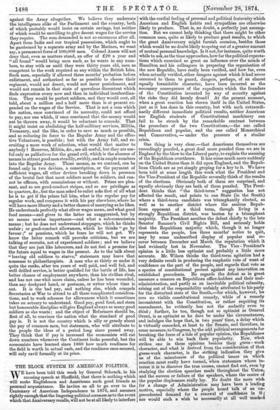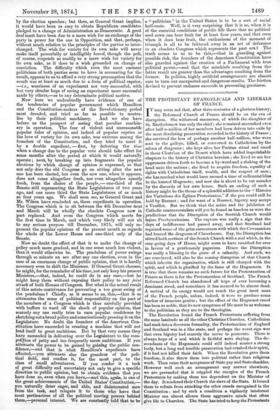THE BLOCK SYSTEM IN AMERICAN POLITICS.
WEhave been told this week by General Schenck, in his amusing speech at Sheffield, that there is nothing which will make Englishmen and Americans such good friends as personal acquaintance. He invites us all to go over to the Centenary of American Independence in 1876, and assumes rightly enough that the lingering political soreness as to the event which that Anniversary recalls, will not be at all likely to interfere
with the cordial feeling of personal and political fraternity which American and English habits and sympathies are otherwise likely to produce. That is, no doubt, a perfectly just assump- tion. But we cannot help thinking that there might be other common uses, quite as likely to produce good results, to which the great Anniversary might furnish occasion, besides those which would be no doubt likely to spring out of a greater amount of mutual personal knowledge. Is it not, for instance, quite worth while to ask, as the time approaches, how far the political expecta- tions which exercised so great an influence over the minds of Hamilton and his colleagues in preparing the organisation of the new Republic, have really been verified, and how far, even when actually verified, other dangers against which it had never occurred to them to guard, dangers, perhaps, of an almost equally formidable character, have been incurred as the necessary consequence of the expedients which the founders of the Constitution invented by way of security against the risks they did keenly dread At the present moment, when a great reaction has shown itself in the United States, just as it has done in this country, but with such extraordi- narily different immediate political results, neither American nor English students of Constitutional machinery can fail to be struck by the remarkable contrast between the procedure of the two Constitutions,—the one called Republican and popular, and the one called Monarchical and Conservative, — under the pressure of a similar crisis.
One thing is very clear.—that Americans themselves are exceedingly puzzled, a great deal more puzzled than we are in England by the blow to the Liberal party, to explain the meaning of the Republican overthrow. It has come much more suddenly on the United States than it did upon England, and the Repub-
lican Chiefs are as yet simply groping for a key to it. We have been told at some length this week what the President and the Vice-President of the Republic severally think of the results of the elections. Obviously both of them are surprised, and equally obviously they are both of them puzzled. The Presi- dent thinks that "the third-term" suggestion has not affected the result, and points to one State (111 the South) where a third-term candidate was triumphantly elected, as well as to another district where the zealous Repub- lican opponent of a third term, though living in a strongly Republican district, was beaten by a triumphant majority. The President ascribes the defeat chiefly to the late Senator Sumner's Civil Rights Bill, and seriously holds that the Republican majority which, though it no longer represents the people, has three months' notice to quit, may by some undescribed display of popular zeal re- cover between December and March the reputation which it had evidently lost in November. The Vice - President's opinion is a little less optimist and probably a little more accurate. Mr. Wilson thinks the third-term agitation had a very definite result in producing the emphatic vote of want of confidence on the part of the people, and regards that vote as a species of constitutional protest against any innovation on established precedents. He regards the defeat as in great measure a censure on Republican office-holders and their mal- administration, and partly as an inevitable political calamity, arising out of the responsibility unfairly attributed to his party for the disturbed state of the South,—for which, however, he seer no visible constitutional remedy, while of a remedy inconsistent with the Constitution, or rather requiring its amendment, he evidently has not the audacity even to think; further, he too' though not so optimist as General Grant, is as optimist as he dare be under the circumstances, and indulges the hope that, in two years' time, a delay which is virtually conceded, at least to the Senate, and therefore, in some measure, to Congress, by the odd political arrangements for breaking the force of a tide of popular opinion, the Republicans will be able to win back their popularity. Now, what strikes one in these opinions besides their guess - work character, and what is derived from the consideration of that guess-work character, is the striking indication they give us of the minuteness of the political issues on which reaction must really have turned, when statesmen whose in- terest it is to discover the true causes, cannot find out, even by studying the election speeches made throughout the Union, and the success or failure of the speakers, where the centre of the popular displeasure really lay. No doubt the mere wish for a change of Administration may have been a leading motive, especially where the people heard talk of an on-
precedented demand for a renewal of confidence in ; nor would such a wish be necessarily at all well marked
by the election speeches ; but then, as General Grant implies, it would have been as easy to obtain Republican candidates pledged to a change of Administration as Democratic. A good deal must have been due to a mere wish for an exchange of the party in power for the one in Opposition, and that, perhaps, without much relation to the principles of the parties so inter- changed. The wish for variety for its own sake will never make itself powerfully or intelligibly heard, though the poll, of course, responds as readily to a mere wish for variety for its own sake' as it does to a wish grounded on change of conviction. The difficulty which even the most eminent politicians of both parties seem to have in accounting for the result, appears to us to afford a very strong presumption that the result was at least as much due to a form of political caprice, —i.e., weariness of an experiment not very successful, with but very slender hope of seeing an experiment more successful made by others,—as to any determinate political motive. Now here we undoubtedly have evidence of one of the tendencies of popular government which Hamilton and the Constitution-makers of the Revolutionary period most dreaded, and tried as far as possible to neutra- lise by their political machinery. And we also have before us the prospect of seeing that peculiar machin- ery in operation. The fear of violent and unreasonable popular tides of opinion, and indeed of popular caprice or the love of variety for its own sake, was extreme among the founders of the Constitution, and they tried to meet it by a double expedient, — first, by deferring the time when a change due to the popular vote should take effect for some months after the period at which it would naturally operate ; next, by breaking up into fragments the popular elections by which change of opinion is expressed, so that not only does the old Congress go on sitting after the new one has been elected, but even the new one, when it appears, does not come altogether fresh, nor even altogether equally
fresh, from the choice of the people,— one-third of the Senate still representing the State Legislatures of two years ago, and one more third the State Legislatures of as much as four years ago. We shall soon see, as General Grant and
Mr. Wilson have reminded us' these expedients in operation. The Congress which is to sit between the 4th December hext and March will be wholly the obsolete Congress now in part replaced. And even the Congress which meets for the first time in March, and which very likely will not sit to any serious purpose till December, 1875, will only re- present the popular opinions of the present month as regards the whole of the Lower House and one-third only of the Senate.
Now no doubt the effect of that is to make the change of policy much more gradual, and in one sense much less violent, than it would otherwise be. The pendulum of power swings through so minute an are after any one election even in the case of an enormous change of public opinion that it is hardly necessary even to shift the Ministers. If General Grant chooses, he might, for the remainder of his time, not only keep his present Ministers,—that, indeed, he could do in any case,—but he might keep them without exposing their policy to any joint attack of both Houses of Congress. But what is the actual result of this astute contrivance for preventing a too great swing of the pendulum ? Chiefly, as it seems to us, this,—that it so attenuates the sense of political responsibility on the part of the members of a Congress which is thus carefully provided with buffers to ward off the shock of popular opinion, that scarcely any one really tries to earn popular confidence by sketching out abroad policy and conscientiously pressing it on the Legislature. No doubt the founders of the American Con- stitution have succeeded in creating a machine that will not lend itself to great ambitions. But by that very means they have succeeded in delivering over the Legislature to the corn- petaion of petty and too frequently mean ambitions. If you attenuate the power to be gained by gaining the public con- fidence —and that is what Hamilton's expedients have effected,-you attenuate also the grandeur of the poli- tical field, and confine it, for the most part, to the class of small adventurers. If you render it a task of great difficulty and uncertainty not only to give a specific direction to public opinion, but to obtain evidence that you have done so, even when you have,—and this, again, is one of the great achievements of the United States' Constitution,— you naturally deter eager, and able, and disinterested men from the task, and relegate it to those who have that most pertinacious of all the political moving powers behind theni,—personal interest We are constantly told that to be
a " politician " in the United States is to be a sort of social half-caste. Well, is it very surprising that it is so, when it is of the essential conditions of public life there that no political seed sown can bear fruit for at least four years, and that even when it does bear fruit, the enthusiasm of the moment of triumph is all to be frittered away in an act of deference to an obsolete Congress which represents the past era? The truth seems to us to be this,—that in guarding against possible risk, the founders of the American Constitution have also guarded against the creation of a Parliament with true political power,—and that the misehiefs resulting from the latter result are greater than the advantages resulting from the former. In politics, highly artificial arrangements are almost sure to turn out unexpected and dangerous results. The friction devised to prevent rashness succeeds in preventing greatness.







































 Previous page
Previous page